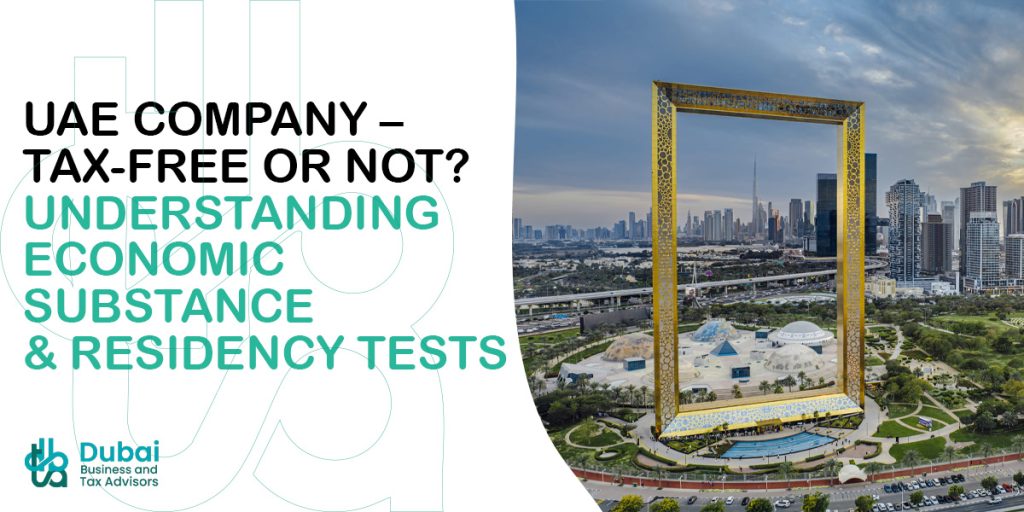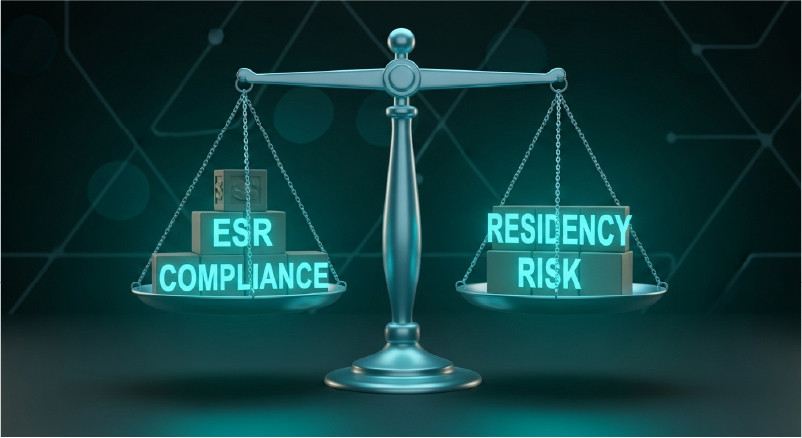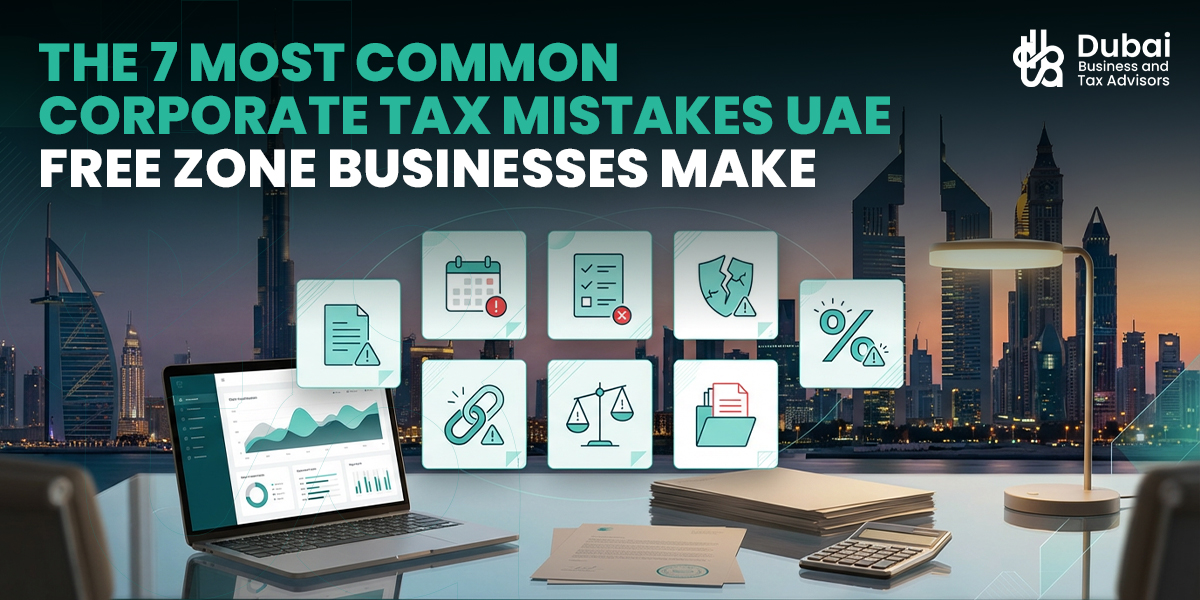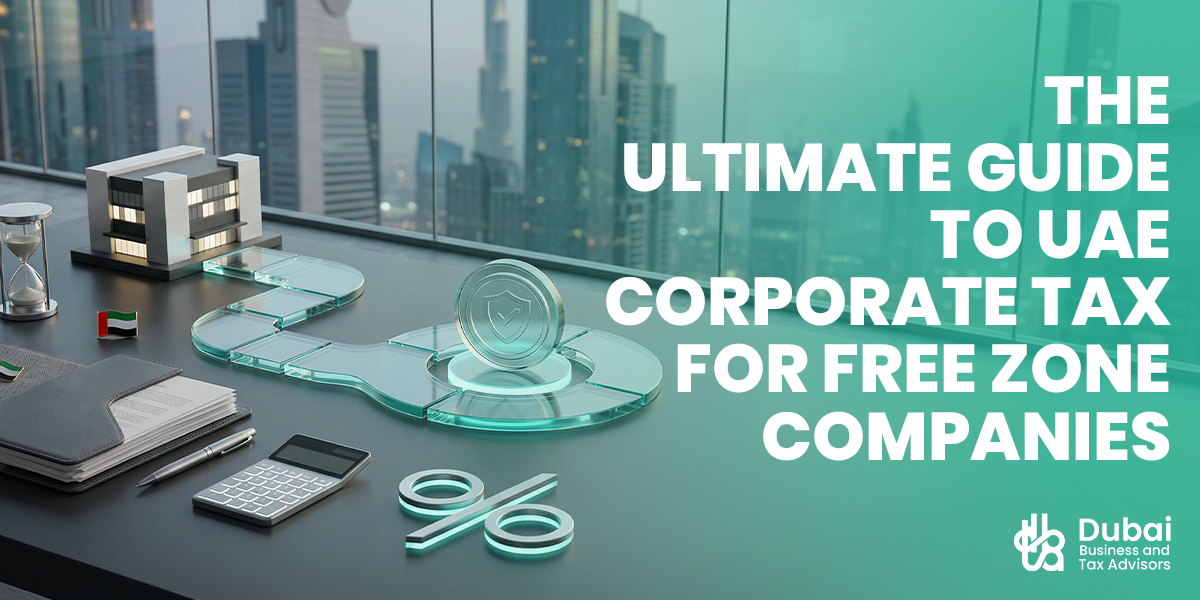UAE Company: Tax-Free or not? Economic Substance & Tax Residency Explained
Recent Insights

Table of Contents
Worried About ESR or Residency Risk?
Book a free 15-minute strategy call with our international tax advisors.

Introduction: UAE’s Evolving Role as a Business Hub
For many years, the United Arab Emirates (UAE) was viewed as a simple shortcut for entrepreneurs who wanted to set up a tax-free company. Its reputation grew on three strong pillars: a strategic location that connects Asia, Europe, and Africa, a politically stable environment, and business-friendly rules that historically avoided corporate taxes. Investors from around the world were drawn in by the idea of a limited company tax-free dividend returns and minimal reporting obligations. But times have changed. The UAE has reshaped its financial and regulatory framework to align with global tax standards.
The introduction of a federal Corporate Tax and stricter economic substance regulations UAE has altered the game. The focus has moved away from marketing the country as a “tax haven” and toward ensuring compliance with international rules such as the OECD’s BEPS initiative. For businesses, this means that understanding tax residency rules for UAE companies, economic substance filing UAE, and the differences in UAE mainland vs free zone tax rules is no longer optional; it is essential. This report explores how the UAE’s tax landscape has evolved and what that means for companies and investors. From applying for a tax residency certificate to meeting the UAE economic substance test requirements, every step matters for businesses that want to remain competitive while avoiding penalties.

The New Face of the UAE Tax Landscape
The UAE’s fiscal changes are not signs of retreat but rather a deliberate strategy to strengthen its standing as a trusted global hub. By enforcing UAE economic substance regulations and participating in the OECD’s Base Erosion and Profit Shifting (BEPS) initiative, the country demonstrates its willingness to ensure that businesses operate with real activities, not just a mailbox address. This concept is often summarized as substance over form, UAE tax, reminding companies that paperwork alone will not satisfy regulators.
Through these reforms, the UAE protects its credibility in the international market. It reduces the risk of being flagged as a non-cooperative jurisdiction, while giving foreign investors more confidence that profits distributed, whether as salaries or limited company tax-free dividend payments, are backed by genuine compliance.
Moving Past the “No Tax” Myth
For decades, entrepreneurs believed setting up in the UAE guaranteed a permanent status as a tax-free company. While it’s true that the UAE still offers advantages compared to higher-tax jurisdictions, the absolute “zero-tax” myth is outdated. The pivotal change came with Federal Decree-Law No. 60 of 2023, which introduced the federal Corporate Tax. Effective from June 1, 2023, businesses became liable to pay tax on net profits. This step permanently reshaped the UAE’s fiscal policy and directly affects the UAE corporate structure and tax implications. What matters now is not whether tax exists, but how companies manage it. From economic substance regulations, UAE reporting to obtaining a valid tax residence certificate, compliance is the new priority. For non-compliance, penalties are steep, and companies risk losing access to double tax treaties that protect them in their country of tax residency.
The new framework operates on a three-tier rate system, designed to support small and medium-sized enterprises (SMEs) while ensuring compliance with international norms. The standard rates are as follows: a 0% tax rate applies to taxable income up to 375,000 dirhams (AED), and a 9% rate is levied on taxable income that exceeds this threshold. A separate, yet-to-be-specified tax rate will apply to large multinational enterprises (MNEs) that meet the criteria of the OECD’s BEPS Pillar Two framework. This policy is a sophisticated move to protect the UAE’s sovereign taxing rights.
The OECD’s Pillar Two framework encourages a global minimum corporate tax rate of 15% on MNEs. Without its own corporate tax, the UAE risked having profits generated within its borders taxed in other jurisdictions through “top-up taxes.” For instance, a UAE company that is part of a large MNE group with its ultimate parent entity (UPE) in a country that has implemented the Pillar Two Income Inclusion Rule (IIR) could have its low-taxed profits subjected to a top-up tax to reach the 15% minimum. By proactively introducing its own 9% corporate tax, the UAE ensures that it is the primary beneficiary of the tax revenue generated within its territory, reinforcing its position as an active, sovereign tax jurisdiction rather than a passive tax haven.
The Critical Role of Economic Substance and Tax Residency
In the evolving UAE fiscal environment, the principle of substance over form in UAE tax has become a central pillar of compliance. This concept is explored through two interconnected, though distinct, regulatory regimes: the Economic Substance Regulations (ESR) and the rules governing tax residency.
Economic Substance Regulations (ESR) in a Post-CT Era
The UAE economic substance regulations (ESR) were originally introduced in 2019 to combat the proliferation of “letterbox companies”. These were legal entities with little to no genuine operational footprint in the UAE, often used solely to shift profits for tax purposes. The ESR was a direct response to international pressure from bodies like the OECD and a clear signal of the UAE’s commitment to preventing harmful tax practices.
The core of the UAE economic substance test revolves around three primary requirements:
- Directed and Managed: A company’s strategic decisions and management must genuinely take place in the UAE. This is demonstrated by regular board meetings held in the country with directors physically present and possessing the necessary expertise.
- Core Income Generating Activities (CIGAs): The key value-adding activities that generate the company’s revenue must be performed within the UAE. For a distribution center, this could be storing and transporting goods; for an intellectual property business, it might be research and development.
- Adequate Employees, Assets, and Expenditure: The business must maintain a sufficient number of qualified employees, physical assets (e.g., office facilities, machinery), and operating expenditures in the UAE that are proportionate to its scale of activity.
While the ESR filing requirements have evolved, the underlying principle of substance remains critical. The requirement for a licensee to file an economic substance filing UAE annually has been a consistent mandate. However, for financial years ending after December 31, 2022, the requirement to submit a full ESR Report and demonstrate the ESR test has ceased for many entities. This modification does not mean the end of the substance principle. Instead, it signals its integration into the new corporate tax framework as the new law explicitly requires free zone companies to maintain “adequate substance” to qualify for tax incentives. Failing this new substance test means losing the 0% tax rate, a direct and significant financial consequence that transcends the fines of the old regime. The principle has moved from being a standalone compliance issue to the very foundation of a business’s tax liability.

Tax Residency & ESR Essentials for UAE Companies
Understand what qualifies you for zero tax, how to meet ESR tests, and the residency certificate process.

Tax Residency for Corporations and Individuals
The concept of tax residency is crucial for determining a company’s or an individual’s tax obligations and their ability to leverage international agreements. The UAE’s legal framework defines residency differently for juridical and natural persons. For a juridical person (a company), it is automatically considered a “Resident Person” for CT purposes if it is incorporated or formed under UAE law, whether in the mainland or a free zone. A foreign juridical person can also be considered a resident if it is “effectively managed and controlled” (Place of Effective Management, or POEM) from the UAE. For a natural person, a country of tax residency is established if they meet specific criteria, such as being physically present in the UAE for 183 days or more in 12 months, or for at least 90 days if they have a permanent residence or conduct business in the country.
The most powerful tool for confirming this status is the tax residency certificate (TRC), an official document issued by the Federal Tax Authority (FTA). Its primary benefit is enabling the holder to access the UAE’s vast network of over 137 Double Taxation Avoidance Agreements (DTAs), which are designed to prevent the same income from being taxed in two different countries. A TRC also enhances a company’s global reputation and provides legal clarity for international banking and transactions. Obtaining a tax residency certificate is a rigorous process that requires more than just a trade license. A legal person must have been operating in the UAE for at least a year and provide documents such as audited financial reports, a certified office lease, and a six-month bank statement.
A critical nuance exists between being a “Resident Person” for corporate tax purposes and a “Tax Resident” for DTA purposes. The definitions are not identical. A foreign company’s branch in a free zone, while considered a “Resident Person” under the new CT law, may not be eligible for a TRC because its ultimate tax residency country is still that of its foreign parent. This distinction is vital for foreign entrepreneurs and investors who may be concerned about issues such as non-resident property tax in their home countries. It means that mere incorporation in the UAE does not automatically grant DTA benefits; the company must meet the explicit criteria of a DTA, which often aligns with the more stringent requirements for obtaining a TRC and demonstrating true operational substance.
Navigating Corporate Structures and Tax Implications
The new corporate tax law has fundamentally altered the choice between a mainland and a free zone corporate structure. The decision is no longer a simple one based on foreign ownership or customs benefits; it is now primarily a strategic tax decision.
The Dichotomy: UAE Mainland vs. Free Zone Tax Rules
The new tax framework has introduced a clear bifurcation in the tax treatment of these two structures.
- Mainland Corporate Tax Rules: A mainland company is a “Resident Person” subject to the standard 9% corporate tax on its global taxable income that exceeds the AED 375,000 threshold.
- Free Zone Corporate Tax Rules: A business in a free zone can, in principle, still enjoy a 0% corporate tax rate. However, this is not an automatic right. To qualify for this zero-tax status, a free zone company must be a “Qualifying Free Zone Person” (QFZP) and earn “Qualifying Income”. All free zone businesses, regardless of their tax liability, must now register with the FTA and file annual tax returns.
The status of a “Qualifying Free Zone Person” is conditional on several factors:
- Maintaining adequate substance in the UAE.
- Deriving “Qualifying Income,” which generally includes income from transactions with other free zone entities and certain passive income.
- Not having voluntarily elected to be subject to the standard 9% tax rate.
- Complying with Transfer Pricing regulations to ensure transactions with related parties are at arm’s length.
The critical shift is that a free zone company’s tax liability is now determined at a transactional level. Income from transactions with mainland businesses is generally considered “non-qualifying” and will be taxed at the standard 9% rate. This means that the
UAE corporate structure and tax implications are no longer a binary choice but a fluid, activity-based analysis where the principle of substance over form UAE tax dictates the tax outcome more than the license type alone.
Understanding the Tax Implications of Dividends
For a company’s shareholders, the tax treatment of dividends is a major consideration. The good news is that dividends paid by a UAE company to its shareholders are generally not subject to corporate tax at the corporate level. This means a limited company tax-free dividend can be distributed from a taxed company’s profits without an additional layer of corporate tax.
For a UAE company receiving dividends from a foreign entity, an exemption from CT may apply under the “participation exemption” regime. This typically requires the UAE company to hold a qualifying shareholding (e.g., a minimum 5% ownership) for at least 12 months. This exemption is designed to prevent the double taxation of profits at both the subsidiary and holding company levels. The choice between a mainland or free zone entity is now a strategic one that requires a deep understanding of a company’s supply chain and customer base. The following table provides a clear comparison of the key differences:
| Feature | UAE Mainland Company | UAE Free Zone Company |
|---|---|---|
| Corporate Tax Rate | 0% on income up to AED 375,000; 9% on income above AED 375,000. | 0% on “Qualifying Income”; 9% on “Non-Qualifying Income”. |
| Taxable Income Scope | All taxable profits from global income. | Based on Qualifying vs. Non-Qualifying Income. |
| Geographic Scope of Trade | Unlimited trade within the UAE and internationally. | Restricted trade with mainland entities to retain 0% tax benefit. |
| Qualifying for Tax Exemption | Automatic for income below AED 375,000. | Conditional upon meeting “Qualifying Free Zone Person” (QFZP) criteria. |
| Substance Requirement | Implicit through CT registration. | Explicitly required as a condition of QFZP status. |
| Withholding Tax | 0% on domestic and cross-border payments. | 0% on domestic and cross-border payments. |
This table underscores that the modern UAE tax regime for corporations is one of clear distinctions and conditional benefits. The principle of substance over form, UAE tax now governs every decision, turning a formerly static choice into a dynamic, activity-based compliance challenge.
Case Scenarios & Practical Guidance
Translating the new tax framework into practice is essential for entrepreneurs and business owners. The following scenarios illustrate how the concepts of substance, residency, and corporate structure intersect in real-world business operations.
Case Studies: Substance Over Form in Practice
- The Pure Holding Company: A company is established in a free zone with a virtual office and a single director based abroad. Its sole purpose is to hold shares in other international companies and earn dividends. While the company may benefit from the limited company tax-free dividend rule on foreign income under the participation exemption, it is at high risk of failing the new substance test. The lack of a genuine operational footprint, including local employees and CIGAs performed in the UAE, could lead to a loss of its QFZP status. The ultimate penalty would be the retroactive application of the 9% tax rate on all its income, along with significant fines. The company must prove that key management decisions and administrative activities are genuinely performed within the UAE to avoid this risk.
- The mainland-Engaging Free Zone Company: A free zone company provides IT services and decides to expand its client base to include clients on the UAE mainland. The new law dictates that income from these new mainland clients will be considered “non-qualifying income” and will be subject to the standard 9% corporate tax rate. This highlights that a free zone company can no longer assume all its income is tax-free. Business owners must now analyze their entire revenue stream and customer base to accurately forecast their tax liability.
Risks of Non-Compliance
The financial and reputational risks of non-compliance with the economic substance regulations in UAE and the new CT law are substantial. The penalties are structured to enforce the seriousness of the new framework.
- Financial Penalties: Fines for failing to file a notification can be up to 20,000 dirhams, while failure to submit a report can be up to 50,000 dirhams. A second consecutive failure to demonstrate economic substance can result in a fine of up to 400,000 dirhams.
- Reputational Damage: Non-compliance can lead to the loss of a business license and the international exchange of information about the company’s beneficial ownership, which can damage the company’s credibility and its ability to secure international banking and partnerships.
- Loss of Tax Benefits: The most significant penalty is the retroactive loss of the 0% tax rate, making a business subject to the 9% tax on all its profits from the start of the relevant tax period.
The following table provides a clear summary of the penalties for non-compliance with the economic substance regulations UAE reporting requirements, reinforcing the seriousness of the regulations.
| Type of Non-Compliance | First Offence | Second Consecutive Offence |
|---|---|---|
| Failure to submit a Notification | AED 20,000 | – |
| Failure to submit a Report | AED 50,000 | AED 400,000 |
| Failure to demonstrate Economic Substance | AED 50,000 | AED 400,000 |
Practical Guidance: Your Compliance Checklist
To thrive in the UAE’s new fiscal landscape, businesses must adopt a proactive and structured approach to compliance. Adhering to the following checklist is crucial for new and existing businesses alike.
- Determine Tax Status: The first step is to understand if your entity is a Resident Person or a Non-Resident Person and if, as a free zone company, it qualifies as a “Qualifying Free Zone Person”.
- Register with the FTA: All businesses, including those operating in free zones and those with profits below the taxable threshold, must register with the Federal Tax Authority (FTA) via the EmaraTax portal.
- Establish a Financial Year: The choice of financial year determines tax return deadlines. This decision must be made and documented with care.
- Implement Robust Accounting: Manual bookkeeping is no longer sufficient. Businesses must maintain comprehensive and accurate financial records and consider a cloud-based accounting system to ensure a clear audit trail and compliance with international financial reporting standards.
- Audit Your Operations: Regularly assess your business model to ensure it meets the economic substance regulations in the UAE requirements. Businesses must have adequate employees, assets, and expenditures in the country.
- Understand Dividend Rules: While the limited company tax-free dividend concept is a key benefit, businesses must understand the complex rules of the participation exemption for foreign income and the implications of double tax treaties.
- Engage a Tax Professional: Navigating this complex and evolving framework without expert guidance can lead to costly mistakes. A qualified tax professional can assist with everything from registration to tax calculations and ongoing compliance.
- Meet Deadlines: Be aware of all deadlines for submitting notifications and tax returns. Late submissions can result in significant penalties.
Why DBTA Is the Right Partner for UAE Tax and Compliance
Setting up and running a business in the UAE today is no longer as simple as opening a license and enjoying “zero tax.” With federal Corporate Tax in place and the introduction of strict economic substance regulations UAE, companies are now expected to demonstrate real activity and maintain compliance year after year. That’s where DBTA Dubai Business & Tax Advisors comes in. Our role goes beyond giving generic advice. We walk businesses step by step through the UAE economic substance test explained, ensuring they understand exactly what regulators expect and how to complete their economic substance filing UAE without risking fines or missed deadlines.
For many clients, the question of tax residency rules for UAE companies is just as important. DBTA assists in preparing the right documentation to obtain a tax residency certificate, helping firms secure recognition of their country of tax residency and benefit from double taxation treaties. We also advise investors and entrepreneurs on the different UAE mainland vs free zone tax rules, highlighting how each choice impacts costs, compliance, and future growth. If your focus is on dividend distribution, we provide guidance on structuring your company so that limited company tax-free dividend payouts remain compliant while still maximizing profitability.
What makes DBTA different is our practical approach. We don’t just explain the UAE corporate structure and tax implications in theory; we apply them to your specific business model. Whether you’re expanding a multinational or building a startup, we help you remain compliant with UAE economic substance regulations, avoid issues with non-resident property tax, and make decisions that are both sustainable and profitable. With DBTA by your side, you can concentrate on growing your business while leaving the complexities of compliance, reporting, and certificates to a team that knows the UAE system inside out.

FAQs
The UAE is often marketed as a tax-free company destination, but that label is outdated. While certain free zones still provide incentives, the introduction of federal Corporate Tax in 2023 changed the rules. Companies are now taxed on profits unless they qualify for exemptions. Businesses must also meet economic substance regulations UAE and may need a tax residency certificate to enjoy treaty benefits. So, while tax is still low compared to many countries, it isn’t “completely tax-free” anymore.
Yes. The federal Corporate Tax applies to both local and foreign companies that generate income in the Emirates. Foreign businesses may also be affected if they establish a tax residency in the UAE or maintain a permanent establishment here. In such cases, the entity must comply with tax residency rules for UAE companies and may need to submit an economic substance filing UAE. However, favorable tax treaties and UAE corporate structure and tax implications can still reduce the effective tax burden.
The idea of the UAE being tax-free comes from its history of attracting global investors by offering limited company tax-free dividend structures, especially in free zones. This strategy made it a magnet for international businesses. However, as global tax standards evolved, the UAE introduced the UAE economic substance regulations and federal Corporate Tax to align with OECD guidelines. Today, while companies still enjoy lower taxes than many other regions, compliance with economic substance regulations, UAE reporting is critical for legitimacy.
For companies, the tax residency rules for UAE companies focus on proving that real business activities take place inside the Emirates. To pass this test, a firm must show local management, employees, and adequate operational spending. In addition, businesses often apply for a tax residency certificate to confirm their official country of tax residency. This certificate is valuable for accessing double taxation treaties. Without meeting the UAE economic substance test explained, firms risk penalties or being treated as non-residents.
Yes. Every business subject to Corporate Tax must file an annual return, even those based in free zones that benefit from special exemptions. Filing ensures alignment with the UAE corporate structure and tax implications as defined by federal law. Companies also have to comply with economic substance regulations UAE and complete their economic substance filing UAE on time. Submitting tax returns and securing a valid tax residency certificate protects companies from penalties while strengthening their standing with both local and international authorities.
The UAE is no longer considered a classic tax haven. While it still provides opportunities for a tax-free company to set up in designated zones, global reforms mean strict oversight applies. Businesses must comply with UAE economic substance regulations, file reports, and often secure a tax residency certificate to establish their tax residency country. The days of purely paper-based entities with no presence are gone. Instead, the UAE has shifted toward a regulated, transparent system balancing incentives with accountability.
Conclusion: Navigating the Regulated Tax Jurisdiction
The UAE has successfully transitioned from a passive, zero-tax jurisdiction to a sophisticated, business-friendly, and highly regulated tax environment. The new framework is not designed to extract revenue from every business indiscriminately but to align with global standards, protect the nation’s reputation, and foster a transparent and legitimate business ecosystem. The myth of the blanket tax-free company is dead. In its place is a nuanced reality where tax benefits are a reward for substance over form, UAE tax and diligent compliance.
For any business owner, investor, or entrepreneur, the key takeaway is clear: the UAE remains a premier destination for business, but success now hinges on understanding and embracing its new fiscal and regulatory framework. Proactive planning, meticulous record-keeping, and expert guidance are no longer optional; they are essential for securing your position and ensuring long-term prosperity. The new UAE is not a tax haven; it is a globally aligned, sovereign tax jurisdiction where a sophisticated approach to compliance is the key to unlocking its full potential.
UAE Tax Residency & ESR Guide
Get the 2025 factsheet on ESR compliance and residency tests

Latest news & articles

The 7 Most Common Corporate Tax Mistakes UAE Free Zone Businesses Make: Avoiding the 5-Year Disqualification
Read More »
AED 10,000 Mistake: What Happens If You Miss the UAE Corporate Tax Registration Deadline?
Read More »About the Author:
AURANGZAIB CHAWLA
As CEO of DBTA, Aurangzaib Chawla advises globally mobile businesses and individuals on cross-border tax planning and structuring. With expertise spanning the UK, UAE, and wider GCC, Zaib helps clients minimise double taxation, protect assets, and achieve long-term financial efficiency while staying fully compliant.
Planning to launch in Dubai or the UAE?
Let’s talk about how to structure your business for growth the smart, compliant, and tax-efficient way
About the Author:
AURANGZAIB CHAWLA

As CEO of DBTA, Aurangzaib Chawla advises globally mobile businesses
and individuals on cross-border tax planning and structuring. With expertise spanning the UK, UAE, and wider GCC, Zaib helps clients minimise double taxation, protect assets, and achieve long-term financial efficiency while staying fully compliant.
Planning to launch in Dubai or the UAE?
Let’s talk about how to structure your business for growth the smart, compliant, and tax-efficient way.




